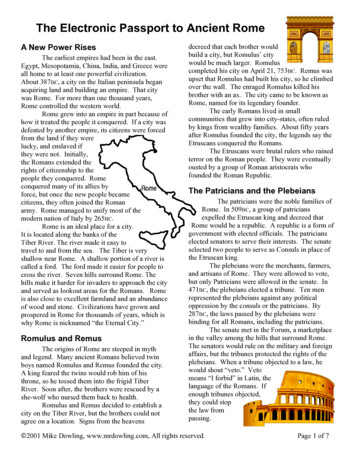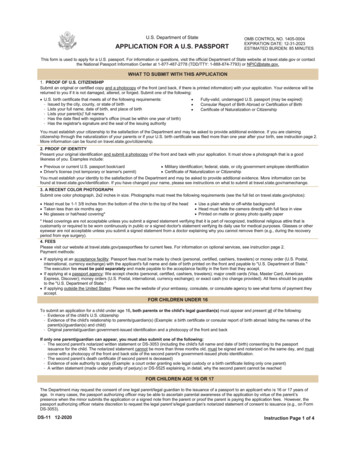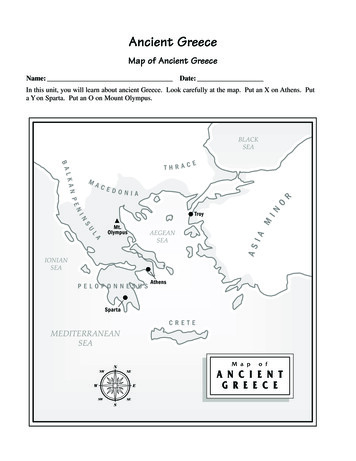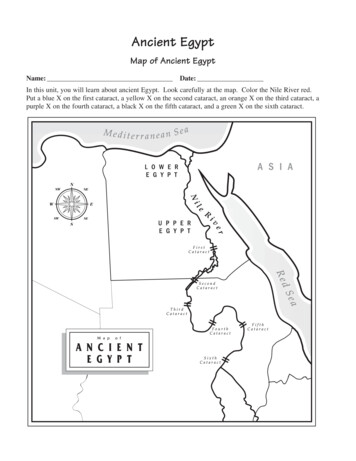
Transcription
The Electronic Passport to Ancient RomeA New Power RisesThe earliest empires had been in the east.Egypt, Mesopotamia, China, India, and Greece wereall home to at least one powerful civilization.About 387BC, a city on the Italian peninsula beganacquiring land and building an empire. That citywas Rome. For more than one thousand years,Rome controlled the western world.Rome grew into an empire in part because ofhow it treated the people it conquered. If a city wasdefeated by another empire, its citizens were forcedfrom the land if they werelucky, and enslaved ifthey were not. Initially,the Romans extended therights of citizenship to thepeople they conquered. Romeconquered many of its allies byforce, but once the new people becamecitizens, they often joined the Romanarmy. Rome managed to unify most of themodern nation of Italy by 265BC.Rome is an ideal place for a city.It is located along the banks of theTiber River. The river made it easy totravel to and from the sea. The Tiber is veryshallow near Rome. A shallow portion of a river iscalled a ford. The ford made it easier for people tocross the river. Seven hills surround Rome. Thehills make it harder for invaders to approach the cityand served as lookout areas for the Romans. Romeis also close to excellent farmland and an abundanceof wood and stone. Civilizations have grown andprospered in Rome for thousands of years, which iswhy Rome is nicknamed “the Eternal City.”Romulus and RemusThe origins of Rome are steeped in mythand legend. Many ancient Romans believed twinboys named Romulus and Remus founded the city.A king feared the twins would rob him of histhrone, so he tossed them into the frigid TiberRiver. Soon after, the brothers were rescued by ashe-wolf who nursed them back to health.Romulus and Remus decided to establish acity on the Tiber River, but the brothers could notagree on a location. Signs from the heavensdecreed that each brother wouldbuild a city, but Romulus’ citywould be much larger. Romuluscompleted his city on April 21, 753BC. Remus wasupset that Romulus had built his city, so he climbedover the wall. The enraged Romulus killed hisbrother with an ax. The city came to be known asRome, named for its legendary founder.The early Romans lived in smallcommunities that grew into city-states, often ruledby kings from wealthy families. About fifty yearsafter Romulus founded the city, the legends say theEtruscans conquered the Romans.The Etruscans were brutal rulers who rainedterror on the Roman people. They were eventuallyousted by a group of Roman aristocrats whofounded the Roman Republic.The Patricians and the PlebeiansThe patricians were the noble families ofRome. In 509BC, a group of patriciansexpelled the Etruscan king and decreed thatRome would be a republic. A republic is a form ofgovernment with elected officials. The patricianselected senators to serve their interests. The senateselected two people to serve as Consuls in place ofthe Etruscan king.The plebeians were the merchants, farmers,and artisans of Rome. They were allowed to vote,but only Patricians were allowed in the senate. In471BC, the plebeians elected a tribune. Ten menrepresented the plebeians against any politicaloppression by the consuls or the patricians. By287BC, the laws passed by the plebeians werebinding for all Romans, including the patricians.The senate met in the Forum, a marketplacein the valley among the hills that surround Rome.The senators would rule on the military and foreignaffairs, but the tribunes protected the rights of theplebeians. When a tribune objected to a law, hewould shout “veto.” Vetomeans “I forbid” in Latin, thelanguage of the Romans. Ifenough tribunes objected,they could stopthe law frompassing. 2001 Mike Dowling, www.mrdowling.com, All rights reserved.Page 1 of 7
The Punic Warsslavery, burned Carthage’s harbor, and poured salton the Carthaginian farmland. The salt made itimpossible for crops to grow and ensured thatCarthage would never again rival the Eternal City.The Romans depended on the plunder oftheir army. The Roman Senate had to keep thearmy busy, or the army might have turned againstthem. By 265BC, the army was now big enough toJulius Caesardefeat anything it faced. Rome stopped makingRome was a huge and very rich empire aftercitizens of the people it conquered. NewlythesecondPunic War, but the Senate did a poor jobconquered lands became provinces of the Romanof running the republic. The senate was designed toRepublic.govern a city, not a growing empire. The senatorsThe Romans fought three wars againstoften took bribes or were not careful about howCarthage, a city on the north coast of Africa. Thethey voted in the forum. Many Romans wanted awars are known as the Punic Wars because Punciastrong leader, and the ambitious Juliuswas the Roman name forThe Rubicon is one of the most Caesar was an obvious choice.Carthage. The first war wasfamous rivers in history, butCaesar sought the office offought over Sicily, an islandyou won’t find it on any modern consul in 60BC. He had recentlycontrolled by Carthage in themap. Nobody is quite surereturned from Spain where he served a yMediterranean Sea off thewhich of the many streamsear as governor. The two consuls at thesouthwest coast of the ItaliannearthemodernborderofItalytime were Crassus and Pompey, thepeninsula. In 265BC, Sicilyand France was once namedleaders of the war against the slavewas richer than any other landtheRubicon.revolt. Rather than become involved in ain the area and a perfect targetstruggle, Caesar convinced Crassus,for the Roman army. ThePompey,and the Roman Senate to nameRomans won the war andJulius Caesarhim a third consul. This coalition of threeforced Carthage to give updescribed one his militaryequal rulers later became known as theSicily.campaign by saying, “Veni,First Triumvirate.A generation after thevidi, vici,” which means, "IWhen Caesar’s year-long term asfirst war, Rome attackedcame, I saw, I conquered.”consulended,he used his influence to getCarthage a second time, but ahimself appointed governor of Gaul. Gaul was ayoung Carthaginian general named Hannibal nearlyterritory northwest of the Italian peninsula. He ledcaptured Rome. The Romans expected Carthage toan army that captured most of Western Europe.attack from the sea, but Hannibal commanded anCaesar’s successes on the battlefield made him thearmy from land Carthage controlled in modernmost popular man in Rome.Spain. Hannibal led his army in a daring andIn 49BC, the Senate ordered Caesar to returndifficult journey over the Alps while riding ontoRome,but to leave his army behind. Caesarelephants. Hannibal’s army might have defeatedfeared that his opponents would destroy him, so hethe Romans, but Hannibal returned home to defendignored the order and marched his army back tohis native land when Roman soldiers invaded AfricaRome. Caesar’s orders clearly told him not to bringin 202BC. The Roman army defeated Hannibal inhis army across the Rubicon River. When heAfrica and won the second Punic War.marched the army across the river, he knew heCarthage was no longer in a position to hurtfaced an important decision. Caesar knew that if heRome after the second Punic War, but in 149BC,obeyed the senate and disbanded his army, hisRoman leaders decided to destroycareer would be over; but if he marched his troopsCarthage. A Roman senator named Catoacross the river, the Senate would order Pompeyended every speech with the cry,and his army to retaliate. Today when people say“Carthage must be destroyed.” Romethey are “crossing the Rubicon,” they refer to a verydefeated Carthage after almost three yearssignificant decision that cannot be undone.of war. After a siege in 146BC, theCaesar’s army seized control of Italy whileRomans went from house to housePompey and his army fled to Greece. Caesarslaughtering the people of Carthage.hunted Pompey and defeated his army. PompeyThey sold the remaining citizens into 2001 Mike Dowling, www.mrdowling.com, All rights reserved.Page 2 of 7
then escaped to Egypt with Caesar in pursuit. WhenCaesar arrived in Egypt, the ten-year-old king ofEgypt, Ptolemy XIII, presented Caesar withPompey’s decapitated head.The Roman people admired Caesar as a warhero and a strong leader. In 46BC, they elected himdictator of Rome. A dictator is a ruler withcomplete control. In that time, dictators weretemporary rulers elected in times of crisis, butCaesar was elected because of his popularity. Thelast Roman dictator had been elected almost 150years earlier, at the end of the second Punic War.Caesar used his power to make manychanges in Rome, often without approval from theSenate. He instituted the Julian calendar of 365¼days. Caesar’s calendar is closely related to thecalendar we use today. The month of July is namedin honor of Caesar. A year after his election asdictator, the Roman people elected Caesar “dictatorfor life.”The Roman senators wereoutraged at Caesar’s power andpopularity. On March 15, 44BC,Caesar was met by a mob of sixtysenators who stabbed the dictator todeath.they worshipped him as a god.Augustus ruled Rome for 41 years, thoughhe did not call himself an emperor. He was carefulto not meet the same fate as his great granduncle.Augustus was very respectful to the senators, butthe Senate knew he controlled the army and coulddo as he pleased.The Roman army was so strong that itprotected citizens from attacks from the tribes wholived beyond the empire. The powerful,professionally trained forces were divided into largeunits called legions. Each legion would have asmany as 6,000 soldiers. The two hundred yearperiod that began with the rule of Caesar Augustuswas known as the Pax Romana, or the “Peace ofRome.”Roman TechnologyThe Romans used great public projects tomake the city the most advanced ofthe ancient world, and to create thelargest empire of the era. Many ofthe roads, bridges, and aqueducts ofancient Rome are still used today.The Romans built manyroads throughout their empire. Theroads made it easier to travel, moveCaesar Augustustroops, and trade with farawayARomanaqueductWith the death of Marcprovinces. It also made it easier toAntony in 31BC, Octavian became the sole ruler ofcollect taxes. Roman roads followed an exactRome. Octavian took measures to earn the loyaltydesign. The expression, “All Roads Lead Toof the Roman army. He encouraged the soldiers toRome” refers to the fact that Rome was the centerretire from the army by providing them with land.of ancient civilization.Once the soldiers retired, Octavian did not have toRoman engineers brought water into the citybe concerned with the army turning onby building pipelines called aqueducts.him. Further, Octavian knew he couldNine aqueducts provided the Romancount on the soldiers’ support if he waspeople with 38 million gallons of waterchallenged by the Senate.every day. Parts of the Roman aqueductOctavian restored peace andsystem still supply water to fountains inorder to Rome. He made sure the landsRome.throughout the empire were well run andThe Romans built many hugetaxes were fair. Octavian built massivestadiums called amphitheaters. Peopleroads and bridges, governmentwould gather in amphitheaters to watchbuildings, and huge public baths. Heshows with clowns, jugglers, andsaid, “I left Rome a city of marble,acrobats. Some of Roman entertainmentthough I found it a city of bricks.” Thewas very cruel. People would watchRoman people awarded Octavian withfights between wild animals andthe title Augustus, which means,gladiators. Gladiators were usually“respected one.” Many Romans deifiedslaves or criminals who fought withCaesar AugustusAugustus after his death. This meansswords against animals or one another. 2001 Mike Dowling, www.mrdowling.com, All rights reserved.Page 3 of 7
A skillful gladiator might win his freedom bydefeating an opponent. More often, the gladiatorslost their lives.The greatest Roman amphitheater, theColosseum, still dominates the Roman skyline.Only a portion of the Colosseum remains standing.Earthquakes have destroyed some of the structure.Also, engineers used some of the stone from theColosseum to build later Roman buildings. Someof the stone used to build St. Peter’s basilica, thechurch in the Vatican where the Pope resides, camefrom the Colosseum.Perhaps the greatest Roman engineeringachievement was the sewer. Because Rome is in avalley among seven hills, there is nowhere for dirtywater to go. The sewer system made it possible forRome to become the largest city in the world. Thepopulation of Rome swelled to more than onemillion people at the height of the empire. Todaymore than six million people live in Rome.but one day he had a vision in which he believedJesus spoke to him from heaven. Paul spent the restof his life thinking and writing about Christianityand winning new converts to the faith. Through thepersistence of Paul and other Christian missionaries,small Christian communities developed throughoutthe Roman Empire.The first Christians believed that Jesuswould quickly return to earth, so there was no needto create any written records of his life. After aboutthirty years, Christians began to see a need to writedown an account of the life and wisdom of Jesus.About fifty years after Jesus died, Christianscombined the stories of the life and wisdom of Jesusinto four books known as Gospels. Gospel means“good news.” The holy book of Christianity isknown as the Bible and has two parts. The OldTestament consists of the sacred writings of theJewish people and was written long before the timeof Jesus. The New Testament of the Bible includesthe Gospels, along with letters written by Paul andother Christian writers. The Bible has beenChristianitytranslated into more than 1,500 languages and hasMost of the people who lived near Jerusalembeen read by more people than any other book.were Jewish. The Romans were pagans, but theyAt first the Romans did not mind thatallowed the Jews to practice their faith and did notChristians did not worship their gods. The Empireforce them worship Roman gods. About AD30, awas prosperous and there were not many Christians.holy man named Jesus began to attract a followingWithin the next two hundred years, barbarianin the Roman province of Judea. Judea is part ofwarriors attacked the empire. Many Romansthe modern nation of Israel. His followers came tosuggested that bad times were coming to the empirebelieve that Jesus was the son of the God of thebecause a growing group of Christians did notJews and that he performed miracles. The followersworship the Roman gods.of Jesus angered Roman authorities because theyRoman emperors became increasinglyrefused to follow either Jewish or Roman laws. Theintolerantof Christianity. In AD202, emperorauthorities arrested and crucified Jesus. Three daysSeptimius Severus banned any Roman citizen fromafter his execution, Jesus’ followers said they sawconverting to Christianity or Judaism. Those whohim risen from the dead.disobeyed the emperor were often tortured byThe followers of Jesus called him Christ.soldiers or wild animals at sporting events. DespiteChrist is a Greek word that means “chosen one,”the persecutions, Christianity continued to grow.because they believed he was chosen by God to beConstantine ended persecution of Christianshis messenger. In time the followers of Jesuswhenheseized power in AD306. Four years later,became known as Christians. The Christians taughthe made Christianity legal. A legend says that onthat people’s sins would be forgiven if they becamethe eve of a battle, Constantine saw a ChristianChristian. This message was not successful withsymbol in the sky with words that translate to “Bymany Jews, but many pagans responded to the ideathis sign you shall conquer.” Constantine neverof Christian salvation.established Christianity as the official religion ofMany fervent believers carried the messagethe empire, but he did encourage its growth. Heof Jesus throughout the Roman Empire. One of theordered that Christianity be a legal and toleratedmost successful was a Greek-speaking Jew namedreligion.Paul of Tarsus, known to Christians as Saint Paul.Constantine supported the church, but heAs a young man, he helped to persecute Christians,continued to worship Roman gods. In AD337 2001 Mike Dowling, www.mrdowling.com, All rights reserved.Page 4 of 7
Constantine was dying. Only then did he call for abishop so that he could be baptized into the church.Fifty years after Constantine’s death, Christianitybecame the official religion of the Roman Empire.Christianity Spread through theRoman EmpireChristianity grew from a little known,persecuted group to the principal religious faith ofthe Roman Empire. These factors contributed to thespread of Christianity: Christianity appealed to the poor because itpromised a better life after death. Poor people were attracted to a faith that taughtthat all people were equal. The founder of Christianity was an actualperson whose life could be easily understood. Missionaries spread the faith to distant lands. Many Christians were persecuted; otherChristians were inspired by the faith andcourage of those who were mistreated.Constantinople and the Fall of RomeConstantine decided to move his governmentto a place that was safe from foreign invasion. Romewas under attack from barbarian invaders north of theItalian peninsula. In AD330, Constantine moved to acity called Byzantium in modern Turkey. Constantinerenamed the city “Constantinople,” which means “cityof Constantine.”Roman civilization survived for centuries inConstantine’s eastern empire, long after the actual cityof Rome and the empire’s westernprovinces fell to invaders. Historiansrefer to this as the Byzantine Empire. Itincluded modern Greece, Yugoslavia, and Turkey.The Byzantine Empire lasted until 1453, when it fellto Turkish warriors. The warriors brought their faithin Islam to Constantinople, and converted the manychurches to mosques. Constantinople is now knownas Istanbul, Turkey.While the empire continued in the east, thecity of Rome was under attack. In AD410, illiteratewarriors known as Visigoths overran the city. InAD476, a Visigoth warrior named Odoacer madehimself emperor of Rome. The “Eternal City” ofRome continued to exist, but the empire dissolved intomany small kingdoms. Western Europe fell into aperiod of war and disease known as the “Dark Ages.”Then, after about 1000 years, the region experienced a“rebirth” known as the Renaissance. The people ofthe Renaissance referred to the era of the Greeks andthe Romans as “the classical age,” a term we still usetoday.The Roman Empire is gone, but not forgotten.Roman art, architecture, government, and religion arestill a part of western civilization. Roman literature,law, and language have been studied and adopted bymany cultures. For nearly seventeen centuries, theRomans set the standard for future generations tofollow.Constantine 2001 Mike Dowling, www.mrdowling.com, All rights reserved.Page 5 of 7
Caesar's successes on the battlefield made him the most popular man in Rome. In 49BC, the Senate ordered Caesar to return to Rome, but to leave his army behind. Caesar . Each legion would have as many as 6,000 soldiers. The two hundred year period that began with the rule of Caesar Augustus was known as the Pax Romana, .











